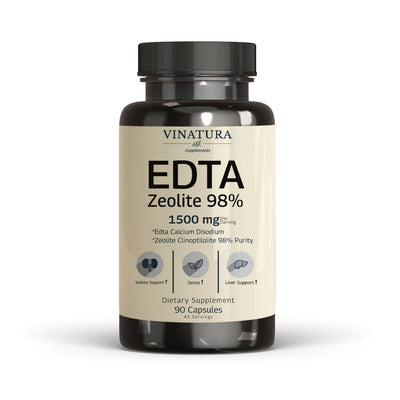
TUDCA Dosage For Gallstones & Its Benefits For Gallbladder
Gallstones are a common condition that affects millions of people worldwide. They are solid particles that form in the gallbladder, a small organ beneath the liver. They can vary in size and composition and may cause pain or discomfort if they block the normal flow of bile. While surgery is often recommended as the primary treatment option for gallstones, there are also alternative options available, including TUDCA supplementation. In this article, this article will discuss the recommended TUDCA dosage for gallstones and its benefits for the gallbladder.
Before exploring further, please read the disclaimer located at the end of this webpage.
The Importance Of Gallbladder

The gallbladder is a small, pear-shaped organ located beneath the liver. Here are some reasons why gallbladder is important:
- Gallbladder stores and concentrates bile, a digestive fluid produced by the liver. When needed, the gallbladder releases bile into the small intestine to aid in the digestion and absorption of fats. [4]
- Bile acids boost energy usage, lower obesity caused by diet, and stop fat buildup in the liver. [1]
- Mucins in bile contribute to the lubrication and protection of the digestive tract, aiding in the smooth passage of food through the intestines.
- Mucins help maintain the stability of the mucous layer in the digestive system, providing a protective barrier against harmful substances and facilitating nutrient absorption. [5]
Should You Use TUDCA For Gallstones?

TUDCA can effectively reduce the cholesterol content of gallbladder bile, reducing the stone formation rate of gallstones according to studies [2].
Research shows that cholesterol, phospholipids, total lipids and the cholesterol saturation index (CSI) in the gallbladder bile of laboratory mice using TUDCA were significantly decreased [2].
TUDCA (tauroursodeoxycholic acid) is a bile acid that has been used for decades for various liver diseases. However, recent studies have also shown its potential in managing gallstones and promoting overall gallbladder health.
However, the use of Tauroursodeoxycholic acid (TUDCA) for gallstones should be approached with caution. Always seek personalized medical advice for your individual health needs, and discuss with your healthcare provider before considering the use of TUDCA or any other supplements for gallstone management.
You also read: The Benefits of TUDCA for Weight Loss: Is It Really Effective
Mechanism Of TUDCA For Gallstones
Research discovered that TUDCA helps stop gallstones. It does this by making bile acids more water-friendly, which prevents the absorption of cholesterol in the intestines, lowers cholesterol levels in the liver, and reduces the release of cholesterol into bile. This overall lowers the risk of having too much cholesterol in the gallbladder, which is linked to gallstone formation [2]
Moreover, TUDCA can hinder the absorption and production of fats in the small intestine by positively impacting the gut bacteria. This, in turn, helps lower the likelihood of developing gallstones. [2]
In the end, using TUDCA not only boosted the production of bile acids in the liver but also lowered the buildup of cholesterol in both the blood and the liver. [2]

TUDCA Dosage For Gallstones
The recommended dosage for TUDCA is to take 250 mg per day [6]. The dosage of 250 mg per day for TUDCA in individuals with gallstones is a general recommendation that can vary depending on the specific circumstances and guidance from a healthcare professional.
It's important to note that the dosage and duration of TUDCA can vary depending on factors such as the severity of gallstones, individual response, and any other underlying health conditions. Consulting with a healthcare professional is crucial to determine the most appropriate dosage for your specific situation.
Read more: How to Take Tudca and Best Time to Take for Maximum Effects
Benefits Of TUDCA For Gallbladder
TUDCA (tauroursodeoxycholic acid) has been studied for its potential benefits in gallbladder-related conditions. Here are some potential benefits of TUDCA for the gallbladder:
- Decreasing the likelihood of stone formation by altering the amount and arrangement of gut bacteria [2]
- Bile acid content in the gallbladder bile increased significantly. [2]
- Increasing bile acid content in the gallbladder bile. [2]
- Anti-inflammatory properties that can help reduce inflammation in the gallbladder. [7]
- Improving bile flow by promoting the flow of bile, then preventing the buildup of bile and reducing the risk of gallstone formation.
- Exhibiting antioxidant properties so reducing oxidative stress in the gallbladder. [8]
You may also like: What are the Benefits of TUDCA for Body Building?
Besides some benefits for the Gallbladder, TUDCA provides favorable effects on other organs, including the small intestine, liver, serum, eyes, and brain,...
- Lipid and bile acid metabolism in the small intestine. [2]
- Decreasing serum and hepatic cholesterol levels and improving liver fat infiltration. [2]
- TUDCA is known for its hepatoprotective properties, meaning it helps protect the liver from damage.
- Promoting the breakdown and absorption of vitamin A, leading to improved visual acuity.
- Reducing neuronal degeneration and alleviating synaptic toxicity, which is associated with some cognitive conditions.
What Should You Be Aware Of When Taking TUDCA For Gallstones?
Does TUDCA Dissolve Gallstones? Please note that TUDCA is often used as a supportive supplement for gallstones. Gallstones cannot be individually removed from the gallbladder, so if they cause severe pain or infection, the entire gallbladder may need to be removed.
Tauroursodeoxycholic Acid (TUDCA) is a dietary supplement commonly used for managing gallstones and other bile-related disorders. However, it's important to be aware that it can have significant side effects. These may include symptoms such as nausea, vomiting, abdominal pain, diarrhea, and constipation. [3]
When choosing a TUDCA supplement, it's essential to look for high-quality products that undergo rigorous testing and quality control. High-quality TUDCA supplements are typically produced through advanced methods, ensuring the product is pure, effective, and free from harmful contaminants. Using a low-quality TUDCA product could increase the risk of side effects or reduced effectiveness.
TUDCA can also potentially cause liver damage, and in rare instances, it may even lead to liver failure. [3]
Additionally, it's crucial to note that TUDCA can interact with other medications, so it is essential to consult with your doctor before considering or using this supplement. [3]
Conclusion
In conclusion, TUDCA has shown promising results in reducing the risk of gallstone formation and improving bile flow in individuals with gallstones. However, it should be used with caution and under the guidance of a healthcare professional. It's also essential to consider potential side effects and interactions with other medications before using TUDCA for gallstone management. Personalized medical advice is recommended for individual health needs to determine TUDCA dosage for gallstones.
References
- [1] Housset, C., Yves Chrétien, Debray, D., & Chignard, N. (2016, June 13). Functions of the Gallbladder. ResearchGate; unknown. https://www.researchgate.net/publication/303959093_Functions_of_the_Gallbladder
- [2] Lu, Q., Jiang, Z., Wang, Q., Hu, H., & Zhao, G. (2021). The effect of Tauroursodeoxycholic acid (TUDCA) and gut microbiota on murine gallbladder stone formation. Annals of Hepatology, 23, 100289–100289. https://doi.org/10.1016/j.aohep.2020.100289
- [3] Housset, C., Yves Chrétien, Debray, D., & Chignard, N. (2016, June 13). Functions of the Gallbladder. ResearchGate; unknown. https://www.researchgate.net/publication/303959093_Functions_of_the_Gallbladder
- [4] Yada Duangnumsawang, Jürgen Zentek, & Farshad Goodarzi Boroojeni. (2021). Development and Functional Properties of Intestinal Mucus Layer in Poultry. Frontiers in Immunology, 12. https://doi.org/10.3389/fimmu.2021.745849
- [5] Ma, H., Zeng, M., Han, Y., Hu, Y., Tang, H., Sheng, J., Hu, H.-P., Cheng, L., Xie, Q., Zhu, Y., Chen, G., Gao, Z., Xie, W., Wang, J., Wu, S., Wang, G., Miao, X., Fu, X., Duan, L., & Xu, J. (2016). A multicenter, randomized, double-blind trial comparing the efficacy and safety of TUDCA and UDCA in Chinese patients with primary biliary cholangitis. Medicine, 95(47), e5391–e5391. https://doi.org/10.1097/md.0000000000005391
- [6] Ursodeoxycholic acid and lithocholic acid exert anti-inflammatory actions in the colon | American Journal of Physiology-Gastrointestinal and Liver Physiology. (2020). American Journal of Physiology-Gastrointestinal and Liver Physiology. https://journals.physiology.org/doi/full/10.1152/ajpgi.00256.2016
- [7] Marı́a José Pérez, & Briz, Ó. (2009). Bile-acid-induced cell injury and protection. World Journal of Gastroenterology, 15(14), 1677–1677. https://doi.org/10.3748/wjg.15.1677
Author

Product Disclaimer
The dietary supplement products mentioned on this website are formulated based on scientific research and adhere to FDA guidelines for dietary supplements. However, the content of the articles has not been evaluated by the Food and Drug Administration (FDA) and is not intended to promote or endorse any specific product. Any products sold on this website are not intended to diagnose, treat, cure, or prevent any disease.
Opinions and Endorsements
Any claims, statements, or opinions expressed in the articles are those of the author(s) and do not necessarily reflect the views or opinions of the manufacturers of the dietary supplement products. The products sold on this website are separate from the content of the articles and are not directly endorsed or associated with the information presented here.
Liability Disclaimer
The author(s) of the articles, website, and manufacturers of the dietary supplement products do not assume any liability for any potential consequences arising from the use of the information provided in the articles. It is recommended that individuals consult with a qualified healthcare professional before making any dietary or lifestyle changes, including the use of dietary supplements.
Product Usage
Please refer to the product labels and packaging for specific usage instructions and guidelines for the dietary supplement products sold on this website.
Customer Support
For any concerns or questions regarding the dietary supplement products, please contact our customer support team, who will be more than happy to assist you.





Leave a Comment
Be the first to comment.
What do you think?